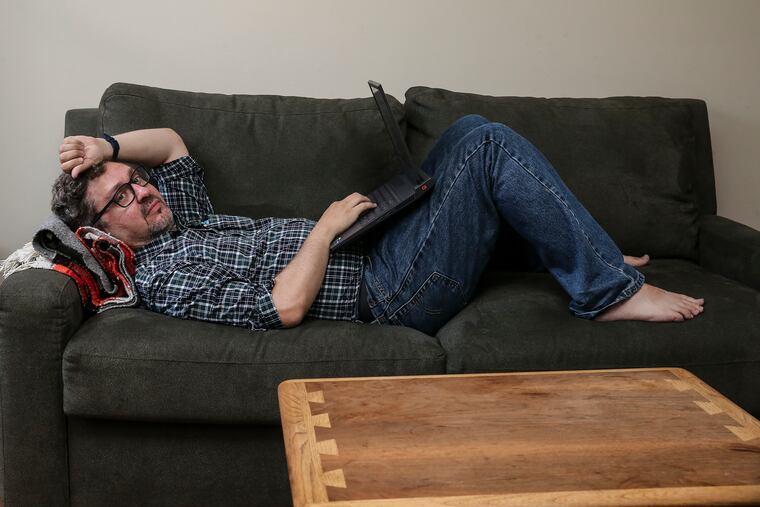People with long COVID shouldn’t have to fight for disability benefits
Some estimates put the number of Americans with long COVID as high as 23 million. That is staggering.

Jonathan Lipman misses his old life.
As a communications consultant, he used to work on grueling election campaigns, pulling 12-hour days, seven days per week. That’s not an option for him anymore, since he got COVID-19 in March 2020 — and then again in March 2022. “I have not worked a full day since I got sick over two years ago,” he told me.
Lipman is one of the millions of Americans with long COVID. Even if he’s just sitting at a desk, he usually can’t work more than four to five hours per day; if he overdoes it, he feels awful the next day. Some days are marked by full body aches and pain, a bad headache, and brain fog, so he can’t focus or concentrate. He gets winded going up stairs.
“I don’t know how much better I’m ever going to get,” he told me. “I don’t necessarily see it changing to the point where I’ll ever be able to work full time again. Which is really scary.”
I agree: Long COVID is really scary. Now that my kid and I are vaccinated, long COVID is the scariest aspect of the pandemic for me (which, if you haven’t forgotten, is still going on). The risk seems impossibly high: The CDC estimates that one out of five adults who survive COVID could have lingering symptoms for months, affecting the heart, lungs, kidney, and other parts of the body. And this can happen even if you are vaccinated.
» READ MORE: COVID cases keep rising and so does the risk of long COVID. Philly researchers are trying to understand why.
Some estimates put the number of Americans with long COVID as high as 23 million. That is staggering, and has some experts wondering if, years from now, COVID will be like polio: remembered more as a source of long-term disability than short-term illness and death.
There are many people in our community who are struggling to recover from COVID, and may never fully recover. And we are not doing nearly enough to help them.
Lipman told me he hasn’t applied for disability benefits because he still works, albeit part time, but from the people he knows who have long COVID and sought benefits, “most of what I hear is frustration and failure,” he said. So he doesn’t bother trying.
This doesn’t surprise me, because getting disability benefits is always hard, even for more established causes of disability such as stroke, injury, or cancer.
The government agrees that long COVID can be a disability, but any application for benefits requires a diagnosis, and many patients with long COVID weren’t officially diagnosed with COVID-19. Like Lipman, they may have gotten infected in the early days of the pandemic, when there were no formal diagnostics — or, if they got sick more recently, they may have taken a test at home and then thrown it away. Long COVID is also not like a herniated disc — it can be hard to produce an MRI or X-ray to prove to the government that you have symptoms that prevent you from working as much as you used to.
“Social Security is not really prepared to handle these types of symptoms resulting from this novel infection,” Nick Feden, an attorney in the Supplemental Security Income Unit at Community Legal Services of Philadelphia, told me. He said he hasn’t heard of anyone who got disability benefits simply because of long COVID, but he’s seen clients who have qualified for benefits after showing that their long COVID has exacerbated existing impairments.
I’m glad the government was quick to establish that long COVID is a source of disability, but I want to make it easier for long COVID patients to get benefits. I want that for every person who is disabled. It feels criminal that we ask people to fight for help when they are least able to, when they are at their most vulnerable, and just getting through the day is hard enough.
“It feels criminal that we ask people to fight for help when they are least able to.”
Lipman cannot work as much as he used to through no fault of his own, and it shouldn’t be so hard for him to receive benefits that make up some of that lost income. It’s time for the government to take more responsibility here. Think of how many cases of COVID stemmed from government inaction, or misinformation (like Donald Trump saying in the early days of the pandemic that COVID is “harmless” and will “fade away”); 20% of those people developed long COVID, and may still be struggling now. In my mind, our government is responsible for that, either directly or indirectly, and needs to step up.
In the meantime, Lipman keeps trying to make as much money as he can with the energy he has, and not worry too much about his family’s financial future, which includes sending two kids to college. “I don’t know how we’re going to be able to do that,” he said.